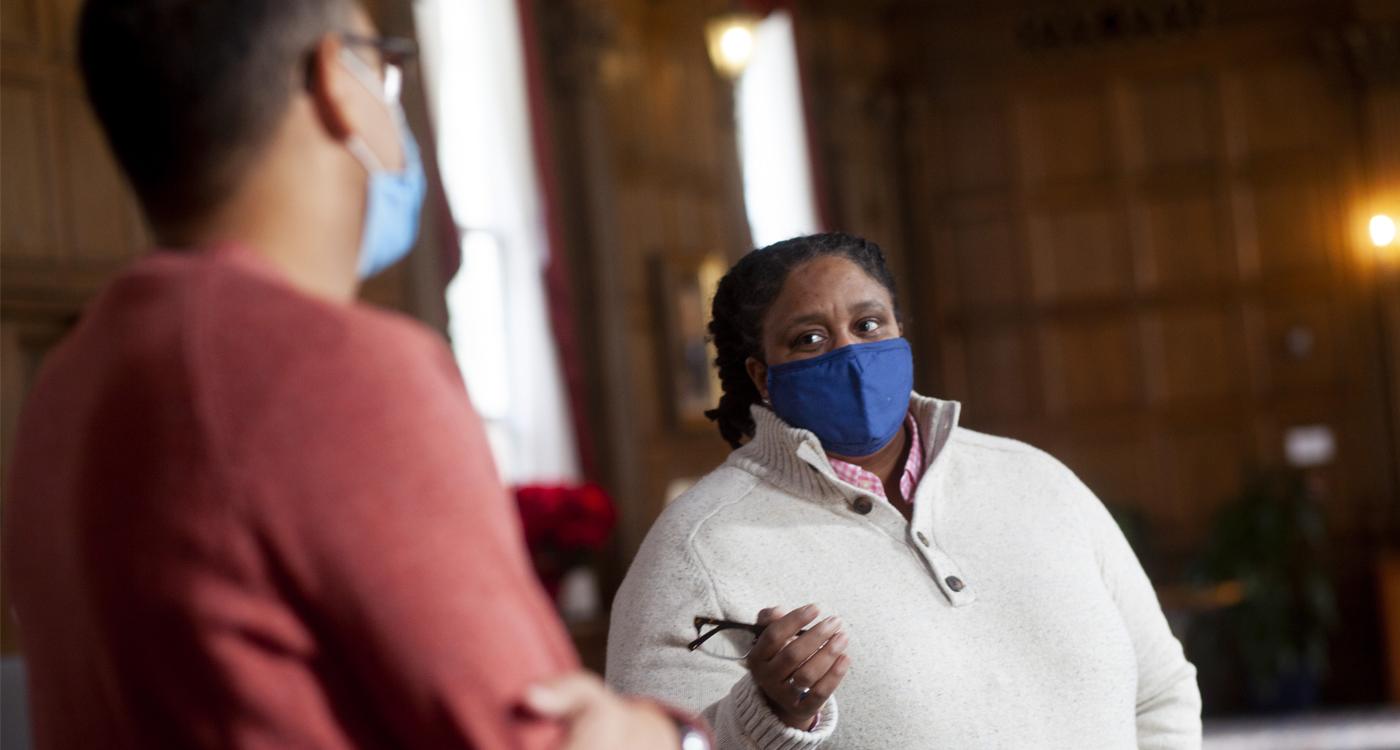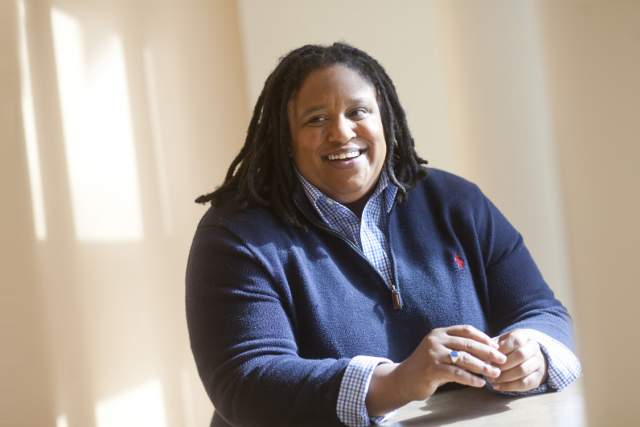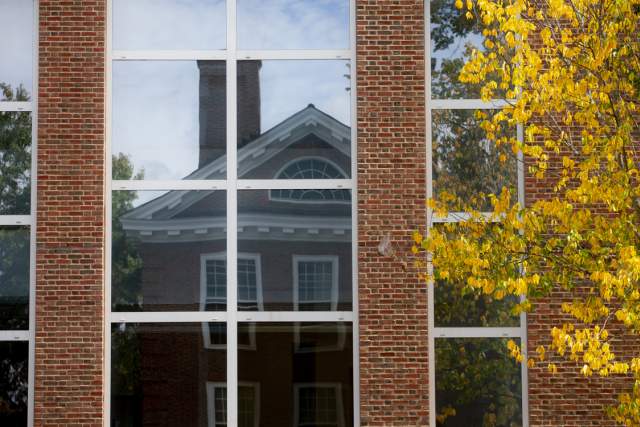Since assuming her new role in September, Dia Draper, assistant dean for diversity, equity, and inclusion (DEI), has been busy meeting with students, peers, and stakeholders throughout the Tuck community as she works to define what DEI looks like at Tuck and how the school will rise to the occasion.
“What I continually hear from students is a strong desire to increase opportunities to learn how to leverage difference and be more inclusive leaders. Students want to talk about the issues of the day around race, gender, sexuality, and identity and the role they play in business, society, and leadership,” says Draper, who joined Tuck in 2006 as part of the admissions office, spearheading diversity recruiting efforts and overseeing the Tuck Diversity Conference. Draper later served as Tuck’s director of strategic initiatives, as well as senior assistant dean and director of Dartmouth’s Office of Pluralism and Leadership (OPAL). “I am more excited, inspired, and driven than ever to help Tuck the institution and Tuck the community realize its potential to lead change in the world by starting in our own house.”
What have you been focused on since your new appointment at Tuck?
The first was transitioning out of my role with OPAL as smoothly as possible with integrity. I have so much respect and admiration for my team and their work there. The second is learning how I can contribute to Tuck in this new role, one whose function is about DEI but which also means that Dean Slaughter is looking to me to contribute to Tuck’s mission and success as a member of his leadership team. And the third is about pulling back the lens on DEI at Tuck. My work has previously been more tactical, more day-to-day, and I now have to look at the full landscape of all we do institutionally, all the areas in which we have the opportunity to move DEI at Tuck forward.
My greatest source of inspiration and pride is the Tuck student. Everything we’re seeing now is a product of students who paved the way at Tuck.
What do the terms diversity, equity, and inclusion mean, and why are they so important to Tuck’s going forward?
What diversity means for Tuck now is ensuring, to the best of our abilities and with the things we can control, that we have the broadest, most talented prospective students in our pipeline. This in turn will ensure that class by class we co-create a space where we fulfill our mission in an environment that has proven itself for more than 100 years to be one of the world’s best educational institutions.
Equity is really about access: how we can remove as many barriers as we can to ensure that the talented people who come here—our women, veterans, people of lower socioeconomic means, international students—who make up each special, magical Tuck class, can thrive. And inclusion is about making sure that all voices have an opportunity to be heard—that people feel valued by and safe in our culture in a way that ensures authenticity at Tuck so that everybody can flourish. Don’t get me wrong, this doesn’t mean that there won’t be friction, disappointment, or harm; it means that we can experience those hard things, recover, learn, and grow.
What things does Tuck already do well in the DEI space?
Tuck faculty, administration, and staff listen to our students, and we empower them to come to us and to each other with solutions, not just problems. Our size allows us to be incredibly nimble, flexible, and fast, so we’re generally able to test and implement things pretty quickly to respond to student needs. And Tuck students, by virtue of the school’s size and culture, have a unique kind of social engagement, which means they’re able to come together as more of a restorative culture than a cancel culture.
In what ways are students galvanizing around work in DEI?
My greatest source of inspiration and pride is the Tuck student. Everything we’re seeing now is a product of students who paved the way at Tuck—people like Herb Kemp T’66 and Pam Scott T’75 [the first Black man and woman to graduate from Tuck], and that first group of students Sally Jaeger met with back in the early ’90s to talk about the first diversity conference. And now, millennials are coming out of undergraduate programs in which social justice is a part of the curriculum. So they have a handle on the language; they’re able to call out institutions and administrations and ask the tough questions. And, again, not just point out the problem but offer potential solutions. The Tuck Student Board has first- and second-year DEI co-chairs, there has always been a strong contingent of allies, and they continue to lead us in experiences like the Tuck Allies through Knowledge and Leadership (TALK) program, which brought reading groups together in the summer and partnered with the Black Students at Tuck Association to offer a second experience for Black Legacy Month.
How can alumni support DEI initiatives at Tuck?
Tuck alumni are critically important. They are in the marketplace, leading increasingly diverse and global teams. For them to give us feedback on what we should be preparing students for, and give students feedback on what they should be looking ahead for, is crucial. And alumni are so involved at the front of the Tuck experience, by recruiting prospective students and, at the other end, by supporting them as they graduate. Our classes are going to continue to be increasingly diverse, and students want to find community at Tuck and once they graduate, both in the broad alumni network and across affinity groups. Navigating a career as, for example, an LGBTQ person has some nuance, and you might want to talk to someone who has that lived experience. If you are a veteran, and you are moving into your first postmilitary job, you might want to talk with someone who shares that experience.

What motivates you in your work and life?
There’s a lot. But mainly my parents, in the way that they raised us. They imbued us with three traits that still drive me: joy, curiosity, and authenticity. They raised us to walk through the world with joy and curiosity and be our authentic selves. I think that motivated me to be curious about people instead of judgmental—you can’t be both. And curiosity leads to warmth and affinity. It draws people in.
My mom used to say, “We’re not meant to get out of this life alive; we’re meant to get through it together.” And that deeply resonates with me.
What diversity means for Tuck now is ensuring, to the best of our abilities and with the things we can control, that we have the broadest, most talented prospective students in our pipeline. This in turn will ensure that class by class we co-create a space where we fulfill our mission in an environment that has proven itself for more than 100 years to be one of the world’s best educational institutions.
I’m incredibly inspired by Tuck students and alumni and the work they’ve done. We could rest on our laurels and say “we’re a top-ten Ivy League business school” and rubber-stamp what we did yesterday. But I find that, with my colleagues here, we all want to be better. We all want to do better. Because we believe our students deserve the best. We know that they're capable changemakers and we know they’re the next generation of leaders. We’re already proud of them and have a high level of affinity for them. And it makes my job so much fun, even on the tough days, to work with people who are so good at what they do and who believe in Tuck's mission. Because nobody gets out of Tuck by themselves.
Ultimately, we want students to leave Tuck equipped to navigate leading and being led by people of diverse perspectives, people with a diversity of experiences. It is an honor to be in this inaugural role, and I am grateful for the opportunity and for the trust of the community.
Editor’s note: This story was edited August 7, 2025, to remove outdated links.

